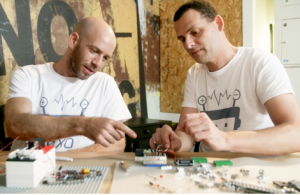Legos and kids go together like peanut butter and jelly. But while the favorite spreads haven’t changed all that much over time, the building blocks children play with in the 21st century certainly have.
Enter BRIXO, an Israeli startup developing electric blocks that bring high-tech functionality to low-tech toys. With BRIXO, kids can create simple electrical circuits using bricks to better understand how electrical connectivity works. Now, children all over the world will be able to bring their Lego creations to life through light, sound and proximity sensors that are able to detect the presence of nearby objects without physical contact; kids can also create mobile cranes, for example, or a nightlight that can be turned on and off with sound.
Integrated with standard-sized building blocks such as Lego, BRIXO safely conducts electricity through its chrome-coated blocks and connects to devices such as smartphones to add a modern element of interactive awesomeness – no wires or prior engineering knowledge are needed. Since BRIXO is intuitive, builders learn how circuits work as they continue to build.
The crowds seem to be cheering for these animated Lego blocks: Over the course of only two weeks, BRIXO’s crowd-funding campaign on Kickstarter raised $422,000, eight times more than its original $50,000 goal. BRIXO’s starter kit, which sells on Kickstarter for $29, includes a battery case, one motor block, 32 blocks, one LED light, and a light switch.
For kids, inspired by kids
BRIXO’s co-founder Boaz Almog, a quantum physicist by trade, got the inspiration for his startup from watching his son play with an electric science kit. When he asked his son to point out the circuit he had just wired, he couldn’t, due to the tangled mess of wires on the board. That’s when Almog came up with the idea for BRIXO, wireless building blocks that conduct electricity. He then teamed up with Amir Saraf, a researcher in the physics department at Tel Aviv University, and in 2015 they co-founded BRIXO Smart Toys.

“Kids today don’t play with physical objects such as board games as much as they used to,” Almog said in a statement. “They know how to use technology, such as phones and computers, from such a young age, but don’t understand the technology and engineering behind those devices.”
According to Almog, STEM (Science, Tech, Engineering, Math) is missing from our children’s education, and we need to “close that gap, worldwide.”
BRIXO’s education division is now developing electrical engineering programs for children in 25 countries, in collaboration with Young Engineers, a global organization that provides STEM education programs for children. This initiative will develop electric engineering programs using the BRIXO blocks for children and is expected to reach 4 million elementary school students in 27 countries, mostly in Africa, within the next five years. The pilot program will start with 20,000 students in 2017. Countries include the US, Ivory Coast, Nigeria, South Africa, Philippines, India, Vietnam and Singapore, to name a few.
Through this program, “children worldwide can really create anything their imagination desires,” the Israeli founder of Young Engineers, Amir Asor, said in a statement. “Anything is possible through BRIXO’s blocks,” which can even be triggered by Internet of Things (IoT) technology.
When asked how BRIXO differs from similar electric building blocks, BRIXO officials explained that unlike their competition, their blocks are wireless (no wires, literally), elegant and much more durable. What makes BRIXO fundamentally different from standard building blocks are the LED lights, motor blocks, sound, light, and proximity sensors at the core of the product. With these trigger blocks, a Bluetooth-enabled battery brick, the BRIXO mobile app (that’s in the making), and the entire world of IoT, there isn’t much that imaginative young builders can’t do.
Source nocamels



















